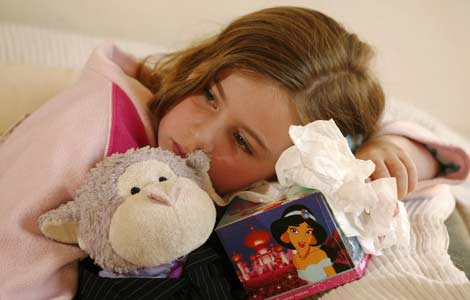SHARES

“Sophia is not feeling good. She started to have runny nose and cough after getting caught in the rain. Last night, we woke up 5 times because she is crying and shaking with fever.” Jane is worried her 5-year-old daughter got sick from the bad weather.
Does a changing weather make you sick?
People commonly believe that when the weather changes, one can fall sick more easily. Although changing weather conditions do co-relate to more people getting sick, this is not the cause for your illness. You only get sick when you are infected by germs in the air!
In temperate countries, outbreaks of flu and colds during autumn and winter seasons take place when the temperature drops and the air becomes drier. When it is cold and dry, many strains of viruses survive well in such conditions. To make matters worse, the dry wind also causes the protective mucus layer along your airway to dry up faster.
Likewise, in tropical Southeast Asia, people do get colds and flu because of the weather. For example, if you get caught in a sudden heavy rainfall especially after a long hot day, you can easily get sick. Why? Firstly plentiful bacteria and viruses can thrive under different conditions in the tropics. Secondly, when your body is cold, the wet skin would be unable to maintain normal body temperature, thereby weakening the body’s immune system. That is why getting drenched in rain leads to you catching a cold.
Prevention tips and what to do when you have the common cold and flu
1. Covering your nose and mouth when sneezing and coughing
Germs spread through air droplets from your sneeze and cough. Therefore use face masks or cover your nose and mouth when sneezing and coughing.
2. Hand hygiene
Wash your hands every time after sneezing and coughing, plus get rid of the habit of touching your nose and mouth. Use a hand sanitizer or wash with soap before eating and after using the bathroom too.
3. Cleaning and disinfecting your home
Similarly, to prevent spreading germs, disinfect and clean furniture surfaces (door knobs, phones etc) and linen.
4. Resting at home, good nutrition and stay hydrated
Take a break from work or school and rest at home to minimise spreading of viruses in a closed room. Take good nutrition, drink a lot of water and get enough sleep too. Generally, you can get back to work or school the day after your fever subsides.
5. No smoking
Cigarette smoke can dry up your airway mucus and weakens your body defence towards germs in the air. Avoid smoking or exposure to second-hand smoke.
6. No antibiotics (unless it is a bacterial infection)
Generally common colds and flu are caused by viruses. Sometimes, bacterial infections can mimic colds and flu or present as a secondary bacterial infection. In such cases, your doctor will confirm with testing, then prescribe antibiotics only if positive for bacterial infection. Frequent unnecessary use of antibiotics is undesirable as resistant“superbugs” may develop.
7. Vaccine
Check with your doctor to get immunised against the flu and get the right immunisation before you travel.
8. Herbal, complementary and alternative medicine
Some natural therapies may help in the prevention of colds and flu, including zinc, Vitamin C, maoto (麻黄汤), licorice (干草), antiwei (安体威颗粒), bai shao (白芍), North American ginseng, guava tea, pomegranate, berries, echinacea and carnosic acid plant extract.
Conclusion
Everyone gets the common cold. Children on average gets 4-8 infections per year while adults get 2-4 colds per year. However, if you suffer from frequent colds despite proper prevention, you may be having some other health problems. Check this out with your doctor to rule out asthma, allergic rhinitis, polyps in your nose etc.
Find a GP/Family Doctor in Malaysia, on GetDoc
Find a GP/Family Doctor in Singapore, on GetDoc
References:
- Jamal IS. The burden of human influenza in Malaysia. Med J Malaysia. 2015 June;70(3):127-129.
- Anne M. Upper respiratory tract infection [Medscape]. WebMD LLC. 2018. [Available from: https://emedicine.medscape.com/article/302460; last updated on 2018 Jun 21; accessed on 2019 May 5]
- Haider AM. Prevention and treatment of influenza, influenza-like illness, and common cold by herbal, complementary, and natural therapies. J Evid Based Complementary Altern Med. 2017 Jan;22(1):166-174.
by Chang Xian
View all articles by Chang Xian.





